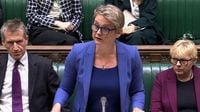On September 1, 2025, the UK government unveiled sweeping changes to its asylum and migration policies, marking one of the most significant overhauls in recent years. Home Secretary Yvette Cooper addressed the House of Commons as MPs returned to Westminster after the summer recess, announcing a temporary suspension of all applications for asylum seekers to bring family members to the UK. This move is part of a broader campaign to tighten migration rules, accelerate the closure of asylum hotels, and address mounting concerns over border security and the exploitation of the system by smuggling gangs.
Cooper told MPs that the suspension of the family reunion route would take effect immediately, with all new applications paused until a new, tougher set of rules is introduced. "This means refugees will be subject to the same family migration rules and conditions as everyone else," she stated, according to ITV News. The government plans to outline comprehensive reforms to the family reunion process later in 2025, with implementation targeted for spring 2026.
Behind this urgent action, Cooper cited the "immediate pressures" faced by local authorities and the "risks" of people smugglers using family reunion as an incentive for dangerous Channel crossings. She emphasized that while the government still values family unity, reforms are essential. "We continue to believe that families staying together is important, and it’s why we will seek to prioritise family groups among the applicants to come to Britain under our new deal with France. But reforms are needed," she said in Parliament.
The government’s asylum policy statement, expected later this year, will propose a new system for family migration. Among the anticipated changes: stricter English language requirements, proof of sufficient funds, contribution requirements, longer waiting periods before newly granted refugees can apply for family reunification, and tailored arrangements for unaccompanied children and those fleeing persecution who already have family in the UK.
This policy shake-up comes as the UK grapples with a dramatic rise in small boat arrivals. According to BBC, over 28,000 migrants have reached the UK in small boats so far in 2025, and more than 50,000 have crossed since Labour came to power in July 2024. August 2025 saw the lowest number of Channel crossings for that month since 2019—55 boats—but the average number of people per vessel climbed to 65, indicating that smuggling networks are packing more individuals onto each boat.
Efforts to crack down on these criminal networks have ramped up. Cooper highlighted the National Crime Agency’s (NCA) record-breaking 347 disruptions of immigration crime networks in 2024-25, a 40% increase from the previous year. She pointed to operations in Europe targeting the supply of boats and engines, including the seizure of 45 dinghies at the Bulgarian border over July and August. "Our action to strengthen border security, increase returns and overhaul the broken asylum system are putting much stronger foundations in place so we can fix the chaos we inherited and end costly asylum hotels," she told the Commons, as reported by BBC.
Part of the government’s new approach involves a "one in, one out" pilot returns deal with France. Under this scheme, some migrants arriving in the UK on small boats will be detained and returned to France, while the UK will accept a reciprocal number of approved applicants. The first deportations to France under this 11-month pilot are set to begin in the coming weeks. Cooper explained, "Applications have also been opened for the reciprocal legal route, with the first cases under consideration subject to strict security checks. We’ve made clear this is a pilot scheme, but the more we prove the concept at the outset, the better we will be able to develop and grow it."
The government’s commitment to ending the use of hotels for asylum seekers has become a central pillar of its strategy. The issue has stoked public anger and led to widespread protests across England and Scotland, including in Epping, London, Gloucester, Portsmouth, Warrington, Norwich, and Falkirk. The protests intensified after an asylum seeker housed at the Bell Hotel in Epping was charged with several offences, including an alleged sexual assault, prompting both demonstrations and counter-protests.
Legal battles have played out alongside the protests. On Friday, the Court of Appeal overturned a temporary injunction that had blocked the Home Office from housing asylum seekers at the Bell Hotel in Epping. Epping Forest District Council, which sought the injunction, is now weighing an appeal to the Supreme Court. The full written judgment from the Court of Appeal is expected imminently, with a permanent High Court hearing scheduled for mid-October. According to BBC, ministers welcomed the ruling, saying it would allow the government to phase out asylum hotels "in a planned and orderly fashion." However, some councils remain determined to pursue legal avenues to prevent hotels in their areas from being used for asylum accommodation.
Prime Minister Sir Keir Starmer has also weighed in, stating his desire to "close these hotels as quickly as possible," though he stopped short of setting a firm deadline. His spokesperson told ITV News, "The way to do that is to work through the backlog." The government has committed to emptying all hotels currently housing migrants by the end of the current Parliament, which could stretch to 2029, but Starmer has hinted at efforts to accelerate the timeline.
Not everyone is convinced by the government’s approach. Conservative shadow home secretary Chris Philp dismissed the new family migration rules as a "tiny tweak" that would have little impact. "I'm afraid the truth is this is a tiny tweak that will make very little difference," he told BBC Breakfast. Philp accused the government of being "in complete denial" about the scale of the border crisis and argued that "people who cross the channel illegally shouldn't be able to bring any family members over here at all." He added, "If the government was serious about fixing this issue, what they would be doing is making sure that everybody who arrives illegally is immediately removed."
Reform UK, another opposition party, criticized Labour for siding "with foreign courts and outdated treaties" and claimed that record numbers of crossings since Labour took office showed no signs of slowing. The party said it had a "detailed plan to deport over 600,000 illegal migrants" in its first term if elected, and urged all 12 councils under its control to pursue legal options to prevent the use of local hotels for asylum seekers.
Within the government, Cooper insisted that reforms would ensure "every asylum hotel will be closed for good under this Government, not just by shifting individuals from hotels to other sites, but by driving down the numbers in supported accommodation overall." She stressed the importance of a "controlled, managed and orderly programme," promising to clear the appeals backlog and continue increasing returns.
As the UK embarks on this new phase of migration reform, the coming months will reveal whether these measures can stem the tide of Channel crossings, restore confidence in the asylum system, and resolve the contentious issue of asylum hotels. The debate is far from over, but the stakes—for communities, councils, and those seeking sanctuary—could hardly be higher.


